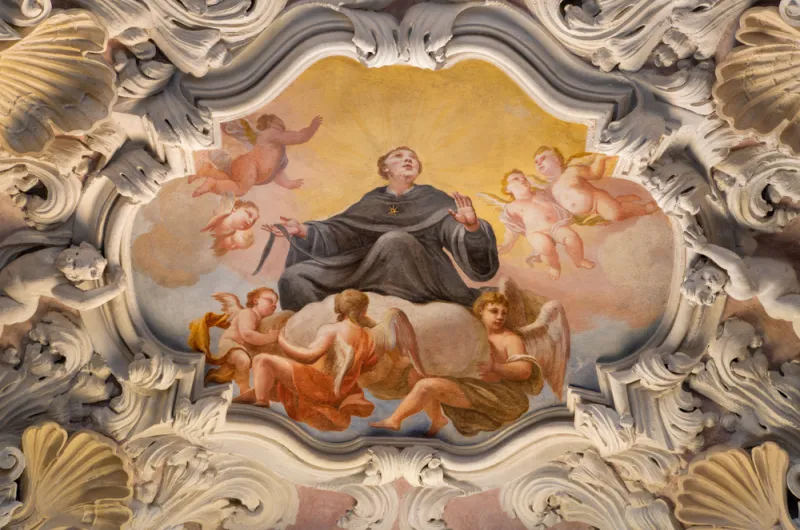
St. Louis, Mo., Sep 10, 2022 / 06:00 am (CNA).
The Catholic Church’s teaching on purgatory — the “cleansing fire” that prepares the elect for heaven — can be difficult to understand. But for one saint, the Catholic imperative to pray for the dead was made very real to him — according to the story, one of his deceased friends appeared to him asking for prayers.
Though such an explicit apparition likely will not happen for most, Catholics can still draw inspiration from the holy example of this saint, Nicholas of Tolentino, whose feast day the Church celebrates on Sept. 10.
Born in 1245 in the town of Sant’Angelo in central Italy, Nicholas was drawn to the Augustinan religious order at a young age after hearing a sermon from the local superior on the vanity of the world. The order was in the nearby town of Tolentino, and after studying for seven years, Nicholas was ordained to the priesthood.
Nicholas was a charitable and holy man who often fasted, practiced self-mortification, and spent long hours in prayer. He fed the poor he encountered in a special way — he gave them blessed bread dipped in water. The reason he did this was that he once had a vision of the Virgin Mary telling him to dip bread in water and eat it to regain his health.
Thanks in part to these “panini benedetti” (blessed sandwiches), Nicholas was known for obtaining healings for many of the sick who lived in Tolentino — and even raising some people from the dead.
The Catholic Church formally defined the doctrine of purgatory during Nicholas’ lifetime, at the Second Council of Lyon in 1274. The doctrine teaches that when a person dies in God’s grace, he or she either goes straight to heaven or undergoes a state of purification before entering heaven called purgatory.
So how did Nicholas become associated with this doctrine?
As the Midwest Augustinians tell it, Nicholas was asleep in bed one night when he heard the voice of a deceased friar he had known. The friar told Nicholas that he was in purgatory and urged him to celebrate the Eucharist for him and other souls there, so that they would be set free by the power of Christ. After Nicholas did so for seven days, the friar again spoke to him, thanking him and assuring him that a large number of souls were now with God.
Nicholas is also the subject of numerous legends — some of which are rather bizarre. A 16th-century painting depicts Nicholas, bedridden and sick, refusing to eat but blessing two cooked partridges (he was a vegetarian). The dead partridges subsequently flew away.
Nicholas died of illness in 1305 or 1306, and Pope Eugenius IV — also an Augustinian — canonized him in 1446 after recognizing some 300 miracles attributed to him. In addition to being the patron saint of souls in purgatory, Nicholas is also considered the patron saint against epidemic disease and against fires.
If you value the news and views Catholic World Report provides, please consider donating to support our efforts. Your contribution will help us continue to make CWR available to all readers worldwide for free, without a subscription. Thank you for your generosity!
Click here for more information on donating to CWR. Click here to sign up for our newsletter.




The vain imaginings of man! Our folly and turning a blind eye to how God views matters. This concept is an affront to the sacrifice of the Lord Jesus Christ.
1 John 1:7 But if we walk in the light, as he is in the light, we have fellowship with one another, and the blood of Jesus his Son cleanses us from all sin.
Ezekiel 36:25 I will sprinkle clean water on you, and you shall be clean from all your uncleannesses, and from all your idols I will cleanse you.
Romans 5:9 Since, therefore, we have now been justified by his blood, much more shall we be saved by him from the wrath of God.
Titus 3:5 He saved us, not because of works done by us in righteousness, but according to his own mercy, by the washing of regeneration and renewal of the Holy Spirit,
Romans 3:24 And are justified by his grace as a gift, through the redemption that is in Christ Jesus,
Titus 2:14 Who gave himself for us to redeem us from all lawlessness and to purify for himself a people for his own possession who are zealous for good works.
Romans 3:20 For by works of the law no human being will be justified in his sight, since through the law comes knowledge of sin.
Our sanctification is fraught with all manner of difficulties. The Lord is faithful though, full of mercy and undeserved grace.
2 Maccabees 12:42-46
And they turned to supplication, praying that the sin that had been committed might be wholly blotted out . . .. In doing this he acted very well and honorably, taking account of the resurrection. For if he were not expecting that those who had fallen would rise again, it would have been superfluous and foolish to pray for the dead. But if he was looking to the splendid reward that is laid up for those who fall asleep in godliness, it was a holy and pious thought. Therefore, he made atonement for the dead, so that they might be delivered from their sin.